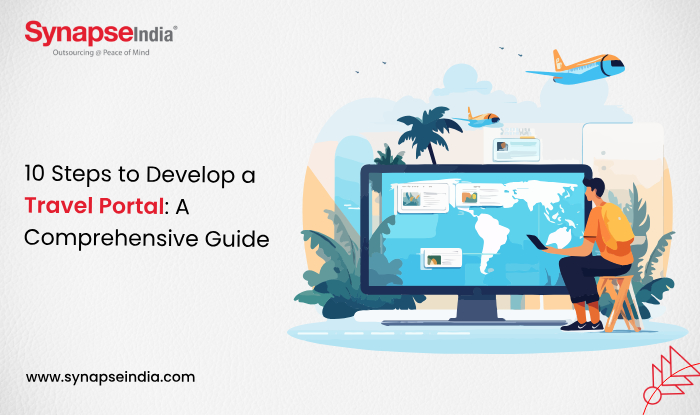 18 Oct 2024
18 Oct 2024
Travel portal development is for anyone involved with traveling. Whether you own a travel business, work in the travel sector, or love to write travel blogs, having a travel portal is important. Through your travel website, you can familiarize customers with your offerings like as providing hotel or flight booking, helping travelers plan their travel itinerary, or guiding them through new places through travel blogs.
Traveling has always provided people with a way to escape the boredom of their daily lives. Other than this, traveling for work, to promote health, etc. has also become very common. This has resulted in a boom in the travel and tourism industry, making it the best time to create a travel portal for your business.
Having a travel website allows businesses to reach potential customers smoothly by sliding into their mobiles and laptops. Since most people prefer using their mobiles and laptops to plan and book their travel, what more reason could you need for developing an intuitive travel portal website?

Before learning about how to create a travel portal, you must know about the essential features that should be included in a travel portal. These features will help your customers plan their travel effortlessly, which is obviously the basic function of a successful travel website.
A travel website should allow users to find what they are looking for without making it a big deal. Allowing visitors to flow smoothly through your travel website is a definite way to enhance their satisfaction. You should include a spontaneous menu, clear categories, and a sitemap, to make site navigation easy for the visitors.
Allowing users to search for flights, accommodation or other services based on filters like destination, pricing, travel dates, ratings, etc. is another way to improve their satisfaction. You should try to provide as many useful filters as possible on your website to make travel planning and booking easier for visitors.
A dedicated section where visitors can find informative content such as travel tips, destination guides, etc. should be included on your travel website. Placing such content on your website not only allows visitors to make informed decisions but also inspires them to book their travel from your website.
If you aim to provide your customers with an amazing experience in international travel, having multilingual and multicurrency support is a must for your travel portal website. Traveling to international destinations has become a frequent phenomenon and therefore you should think about integrating multilingual and multicurrency support into your website.
Even before buying a small spoon, customers like to check their ratings and reviews so that they get value for money. So, when it comes to traveling to distant destinations that is surely going to cost more than buying a spoon, they would like to check reviews of their flight, accommodations, and other services.
It might be a little debatable as to how important it is to provide a weather forecast feature in a travel portal. However, weather conditions, including temperature, humidity, and wind speed play an important role in deciding the traveling plans of travelers. If you provide a weather forecast feature on your website, it will allow your customers to plan their trips more effectively.
Showing clearly in the open how much their traveling is going to cost, you offer transparency to your customers and earn their trust. Confusing them with hidden or outdated charges is strongly advised against as provides an easy and direct path to losing customers. Also, make sure to display any discount or promotion you are offering boldly on your travel website.
To improve the chances of converting your website visitors into customers, it is recommended to include a call-to-action (CTA) in your travel portal. Intriguing CTAs like Book Now or Check Availability are a direct way to encourage visitors to avail themselves of your services.
In reaching out to potential customers and expanding your business, the importance of travel portal websites cannot be ignored. Check out this comprehensive guide with simple steps for creating an innovative travel portal website for your business.
Start the development process by determining the purpose of your website and its target audience. Whether you are looking for solo travelers, family vacationers, people who travel for work, travelers residing in a particular location, etc. the objective of your travel website may vary. Deciding such things in advance gives you a clear idea of how to proceed with the portal design and development.
After objective and purpose, determining the budget and timeline of your development project comes next. You must set clear-cut goals on both budget and timeline and take proper caution to stick to the original goals. An important step in achieving this goal is deciding on the core features of your travel app in advance.
While planning travel portal development, deciding the revenue model is something that requires deep thought. You can select commission fees from hotels and flights booked through your website. You can also promote and advertise travel services offered by others on your website. Paid subscriptions and premium memberships to provide special offers upon booking is another way to generate revenue.
Get a domain name for your website that is simple and easy to remember and is a reflection of your brand identity. After selecting a suitable domain name, register it with a trusted provider. Now select a reliable web hosting that plays a key role in the success of your travel website. It is a web hosting that makes sure that your portal is accessible, scalable and secure.
Using customizable templates, you can create a website design that matches with your business. Make sure that your design is user-friendly and easy to navigate providing maximum clarity to the visitors.
Plan a content strategy to offer informative content about destinations, travel tips, and itineraries to your audience.
Choose the right technology stack to develop your travel website. Decide between a custom-built solution or using content management systems (CMS) and select the programming language you would like to use for development. Integrate a secure payment gateway, social media platforms, and reliable booking and reservation systems if you wish to offer booking services directly on your site.
After your travel portal development is complete, you need to thoroughly test your travel website to make sure it works correctly across different browsers, devices, and screen sizes. Your elaborate testing strategy should include unit testing, performance testing, functionality testing, security teasing and usability testing. Any issue detected at any phase of the testing process should be fixed, to make your website ready for launch.
Once the testing phase is complete and all the issues and bugs are fixed, it is time for the website launch. Before a full launch, consider rolling out a beta version of your portal to a select group of users. Encourage beta users to provide feedback on features, usability, and performance and use this opportunity to find and fix any technical issues. When you are totally satisfied with the functionality and design, it is time for the official launch.
Once you have successfully launched your website, the development phase does not end completely. Proper SEO and promotion are important in order to make your website accessible to your potential customers and to stay competitive in the market. Use social media promotion and perform search engine optimization by identifying relevant keywords and phrases travelers might use. Create valuable content, such as travel guides, blogs, and tips, to attract and engage users.
Once your travel portal is live, it’s essential to monitor its performance and user behavior. Monitor page views, session duration, bounce rates and analyze booking and purchase conversions to identify areas for improvement. Continue to collect feedback through surveys and reviews to enhance user experience. Also, make sure that your website receives ongoing maintenance and support to continue functioning at its best.
Now, to get a website, you will need expertise in travel portal development. You can either have your in-house team create a practical and appealing website or, for a more professional and intriguing look, partner with an expert travel portal development company.
Building a unique travel portal requires a combination of creativity and strategic planning. Keeping a few things in mind can help you design such a portal and offer amazing experiences to your customers.
Check out some important tips that can help you create a website that offers unique and memorable experiences to your visitors, making them come back to your website again and again.
Responsive design of a travel website can provide ideal user experience across various devices. With a significant portion of travelers using mobile devices to plan trips, a responsive design allows for easy navigation, seamless booking, and quick access to information. Thus, a responsive design is important to both reach a wider audience and offer them better services.
By adding high-quality images and videos to your travel website, you can enhance the overall appeal. Interactive elements are vital for a travel website as they enhance user engagement and create a more immersive experience. These elements help users visualize destinations, explore options, and make informed decisions.
Integration is essential for a travel website as it streamlines operations and enhances user experience. By connecting various systems such as booking engines, payment gateways, and CRM software, users can access real-time information on flights, hotels, and activities seamlessly.
An easy and safe checkout process is crucial for a travel website. A streamlined checkout allows customers to complete bookings quickly and efficiently, reducing cart abandonment. Security is important to ensure that sensitive payment information is protected, builds trust and encourages users to proceed with transactions. Incorporating multiple payment options caters to diverse user preferences, further enhancing convenience.
Analytics are crucial for a travel website as they provide valuable insights into user behavior, preferences, and trends. This data-driven approach enables targeted marketing strategies, optimizing user experience and improving content relevance. Additionally, analytics help in understanding customer journeys, allowing for better personalization and service offerings.
By tailoring content and recommendations based on user preferences, behaviors, and past interactions, travelers feel more valued and understood. Personalized suggestions such as customized itineraries, relevant destinations, and targeted offers can lead to increased booking rates and customer satisfaction. Additionally, personalization fosters loyalty, encouraging repeat visits and referrals.
Let us conclude this list with the most important thing, i.e., customer service. Create a help section through live chat or FAQs to assist your customers with any issues or queries they are facing regarding their travel or your website. When the customers feel like their queries are being heard, their trust and loyalty increase automatically.

Travel companies looking for a travel portal development to enhance their business can get a custom website designed for them. SynapseIndia, an expert travel portal development company, has all the techniques up its sleeves needed to provide you with an innovative travel website. From initial consultation to final development and further maintenance, they hold proficiency in complete phases of travel portal development process. According to the specific goals and requirements of your business, they can design tailored solutions.

 09 Aug 2023
09 Aug 2023
